#zenica blues
Explore tagged Tumblr posts
Text
tag game! 5 songs ive been listening to lately (in no particular order):
any two words - midnight doomer cruise
yung gravy - oops!
noah kahan - pain is cold water
zabranjeno pušenje - zenica blues
the front bottoms - batman
i was tagged by @lucija and i tag @plant-eye @purelyphantasmagorical @alexandrianmuse @vjecitiapril and @lilithscuriosity
3 notes
·
View notes
Video
youtube
Zabranjeno pušenje - Zenica blues (spot)
0 notes
Text
Oh also the Zenica Blues
youtube
Randomly it seems like I'm going on a daytrip to Zenica, the only thing I know about it is there's a massive steel plant

#Love how it's a cover of something Johnny Cash wrote but getting arrested in Zenica and hating the fucking place#Youtube#Music#Ex-Yu
10 notes
·
View notes
Text
Ovih sedam rok pesama su obeležile odrastanje u Jugoslaviji - I deo
Ovo nije tekst o sedam najboljih pesama jugoslovenskog rokenrola. Ovo je tekst o pesmama posle kojih su autori postali najpopularniji izvođači rok muzike u SFRJ
1 Tako ti je, mala moja, kad ljubi Bosanac – Bijelo dugme, Goran Bregović
Nije da rokenrola nije bilo u Jugoslaviji šezdesetih i sedamdesetih godina prošlog veka, bilo je tu veoma kvalitetnih i popularnih grupa, ali kao da je falio taj rokenrol za široke narodne mase…
Šta god da kažete o Bijelom dugmetu, nećete pogrešiti. A i o Goranu Bregoviću. Uglavnom, činjenica je da su za vreme svog postojanja (a bilo je to od 1973. do 1989) bili jedna od najpopularnijih rok – ili-kako-već – grupa svih vremena u SFRJ.
Brega selektor i kapiten
Za deceniju i po zvaničnog postojanja, BD je izdalo devet albuma, promenilo trojicu pevača i skoro pa jedan ceo fudbalski tim ostalih muzičara. Čitaj, u grupi je bilo jedno devet što basista, što klavijaturista, što bubnjara. Samo je Brega bio jedan i jedini. Od početka, pa do kraja.
A ovo je tekst o početku.
Tekst o tome kako ih je jedna pesma lansirala među zvezde.
Šta je to bilo toliko dobro – ili-kako-već – u toj Tako ti je, mala moja, kad ljubi Bosanac, pa su se u ono vreme mnoooogi primili? Šta se to raji svidelo?
Ono, kad on nju na početku pita: Jesi l‘, mala, ljubila do sada? Pa joj, a da ona još i ne stigne nešto da kaže, odgovori sa: Jesi, jesi, al‘ Bosanca nisi! I onda dođe onaj vrhunac kad on njoj kaže: Voljećeš me ti, to znaj, što je kasnije u crnogorskoj interpretaciji – ali ne u pesmi nego u vicu – glasilo: ja se tebe sviđam, a ti mene?
Bilo kako bilo (a tako je bilo), nije da Bijelo dugme nije i pre Bosanca imalo neke stihove i hitove. Ma šta ko danas mislio – jeste.
Uglavnom, Bijelo se dugme pre tih četrdeset i kusur godina pojavilo kao nešto, pa hajde da se kaže, novo. Zakoračilo je na prag popularnosti, pokucalo i otvorilo vrata i ušlo u hol slavnih. Sve ostalo su činjenice. Broj objavljenih pesama, prodatih albuma i odsviranih koncerata.
Miroslav, Šaban, Brega
Danas će većina onih koja je odrastala uz pesme Bijelog dugmeta reći da je sve to bilo – seljački. Pastirski rok ili kako već. Iskoristiće definiciju – i to veoma preciznu i lucidnu – novinara Dražena Vrdoljaka, a ta će etiketa pratiti Bijelo dugme do dana današnjeg.
Bilo je to vreme kad se muzika delila na narodnu i zabavnu. Ljubitelji prve imali su svoje idole, pevače, predstavnike. Imali su svog Miroslava Ilića, na primer. On je, slično kao i oni, tugovao za Devojkom iz grada… Znate ono, momak krene da je prati ulicama dugim, a onda se razočaran, kad je vidi s drugim, vrati u selo. Ne Miroslav, nego junak pesme. Miroslav je ostao, evo ga još u gradu i još peva.
Osim Miroslava, oni koji su nosili zastave narodnjaka, imali su i svog Šabana Šaulića. Sa namerom dođoh u veliki grad, pevao je Šaban. Evo ga peva i dalje, već četrdeset sedam godina. I to je himna svih onih koji su u grad pošli, došli i uglavnom ostali. (Tekst pisan dok je još uvijek Šaban bio živ)
E, a s kakvom su namerom u veliki grad došli oni koji baš i nisu bili za Miroslava i Šabana, to ni oni sami nisu znali. Nisu imali pojma. Ali je očigledno znao Bregović! Komponovao im je nešto što je i selo i grad. Nešto kao predgrađe, ali nije ni to. To je samo rokenrol! Jugoslovenski.
Dao im je nešto.
Bijelo dugme im je bilo to nešto. Čim im se pojavio prvi album, a bilo je to 1974, imali su hitove poput: Kad bih bio bijelo dugme, Selma, Ne spavaj, mala moja…
A onda je došla sledeća godina i sledeći album i… raja je, što reko Rambo, krenula da se pali i žari: Tako ti je, mala moja, kad ljubi Bosanac.
To je pesma posle koje ni za Bijelo dugme, ni za one koji su slušali zabavnu muziku više ništa nije bilo isto. Pastirski rok se raširio Jugoslavijom.
Nepuna četiri minuta (3.52) bila su odskočna daska za Sve će to, mila moja, prekriti ruzmarin, snjegovi i šaš, Bitanga i princeza, Doživjeti stotu…
Naravno, Ðurđevdan će ostati ubedljivo najpopularnija pesma Bijelog dugmeta od svih osamdesetak, koliko su snimili, ali sve je krenulo od one Tako ti je, mala moja. Da, baš tako!
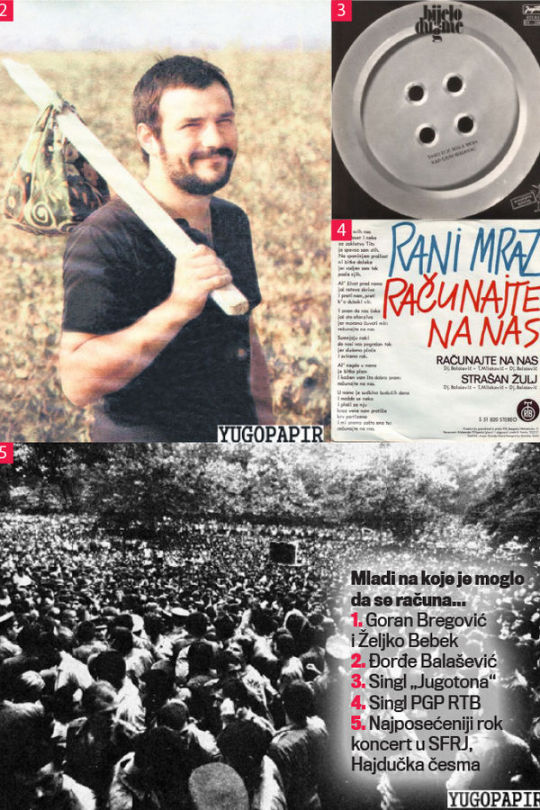
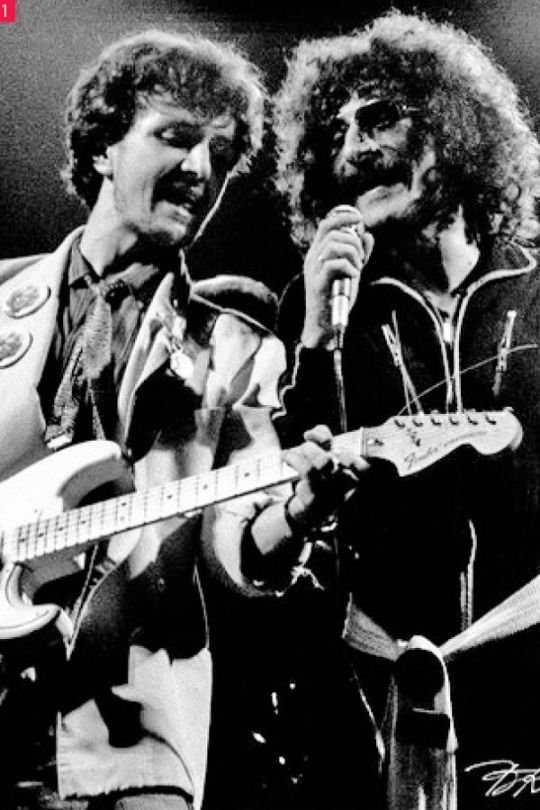
2 Računajte na nas – Ðorđe Balašević
Pa, okej, U razdeljak te ljubim je te, sada već daleke 1977, bila jedna simpatična pesmica, za ono vreme veoma golicljiva. Ali nimalo pretenciozna i ambiciozna. Momak po imenu Đorđe sklepao je stihove, iskomponovao melodiju i sa svojom grupom Žetva sve to lepo otpevao, a to se prodalo u, pazite sad – skoro 200.000 primeraka!
Došao je tiho, nezvano, sam… Stao je pred mikrofon i, naoko snebivljiv i stidljiv, otpevao more politički angažovanih pesama. A nije bio roker
E, da je ubio Tita…
Tad je Jugoslavija čula za Đorđa Balaševića prvi put.
Drugi put to je bilo posle pesme Prva ljubav, 1978, a odmah zatim, iste te godine, i treći put. Kad je svima definitivno objasnio da na njega može da se računa. Kao na perspektivnog i talentovanog mladića.
Je li Računajte na nas pesma prekretnica Đorđa Balaševića? Jeste. Je l‘ ga je ta pesma ljuljnula u orbitu? Jeste. Je l‘ bio popularan od Vardara pa do Triglava posle te pesme? Jeste. Je l‘ i danas ispašta zbog nje? Jeste, ispašta.
– Pa da sam tad ubio Tita, dosad bih ga odrobijao i izašao s robije! – odgovorio je jednom prilikom Balašević na konstantne napade – zašto je uopšte napisao tu pesmu. Pa, bilo je takvo vreme. Dečko je imao 25 godina, bio je pun entuzijazma, kakav i imaju ljudi u tim godinama.
Tad su svi rođeni pedeset i neke u Jugoslaviji bili puni entuzijazma. Ili čega već. Danas im je pun kufer svega, ali to je već neka druga pesma.
Bagrenje i Vasa
Kako god da je bilo, Računajte na nas bila je toliko popularna pesma da niko pojma nema (nije isključeno da se ni sam Balašević ne seća!) šta je te 1978. bilo na drugoj strani ploče! Teško da je iko pojurio u prodavnicu PGP RTB da bi kupio ploču zbog pesme Strašan žulj. Ovu pesmu teško da znaju i najzagriženiji fanovi Panonskog Mornara. A njih je bilo, i ima ih i danas, od Vardara pa do Triglava, kolika je – u jednoj drugoj pesmi – bila ta Jugoslavija.
Balašević je mnogima stao na žulj, ne samo tom pesmom (ne Žuljem nego nezvaničnom himnom mladih SFRJ, kako su ondašnji politički aktivisti nazivali Računajte na nas), već i mnogim pesmama posle, ali i to je neka druga pesma.
I kad bi sada ovde krenulo nabrajanje svih hitova Đorđa Balaševića, oteglo bi se to u beskraj. I kad bi se krenulo s nabrajanjem svih ostalih pesama prekretnica, i to bi se oteglo odavde do…, pa bar do poslednje strane ovog lista. Jedna od onih koje su ga obeležile – i zbog koje je takođe morao da se pravda i da objašnjava zašto ju je napisao – jeste Ne lomite mi bagrenje. Pa onda ide Vasa Ladački… Znate l‘ Priču o Vasi Ladačkom? Ta kako je ne biste znali, toliko se puta vrtela na radiju.
Sve u svemu, svako ko je proživeo makar deset godina u Socijalističkoj Federativnoj Republici Jugoslaviji znao je reči pesme Računajte na nas. Ko drukčije kaže, taj kleveće i laže!
Računajte na nas nije obeležila samo Balaševića (njega najviše kao najvećeg krivca) već i sve rođene pedeset i neke. Zapravo, politika ih je obeležila, a ovo je bila politički angažovana pesma.
Obično politički angažovane pesme imaju svoj rok trajanja: postoje koliko i politička opcija o kojoj se peva(lo). Posle sve to nestane.
Jugoslavija odavno više ne postoji, ne računajte na nju.
A ne računajte više ni na one iz pedeset i neke! Svi su pred penzijom. Ako već ne oru nebeske njive…
SUMNJAJU NEKI
U nama je
sudbina
budućih dana
i neki se možda
i plaše za nju…
3 Lutka sa naslovne strane – Riblja čorba, Bora Ðorđević
Godinama je Riblja čorba koncerte počinjala svojom prvom velikom pesmom. Ona ih je napravila jednom od najvećih rok grupa svih vremena u Jugoslaviji. Sad su neka druga vremena i moderne su neke druge lutke/prostitutke
Daješ da te vole glumci, režiseri… Ovako je počinjalo skoro svako opijanje u parku, ili gde se već mladež okupljala, pa se uz jednu raštimovanu gitaru i nekoliko flaša piva ili vina kretalo u svet muzike i svet odraslih, ozbiljnih, zaposlenih…
Lutka sa naslovne strane pesma je kojom je počinjalo prvo tinejdžersko tugovanje za tamo nekom koja se dala tamo nekom… Ono kad imaš, recimo, šesnaest ili sedamnaest godina, mrziš narodnjake, a mrziš i tu koja te ostavila, pa sedneš s ortacima iz škole ili kraja, pa zapevate, onako promuklo, imitirajući Boru Đorđevića iz mlađih dana.
Šta je pesnik hteo da kaže
Pesma Lutka sa naslovne strane nije – reći će mnogi rok kritičari – najbolja pesma Bore Đorđevića i Riblje čorbe, ali je najvažnija. Bila je – prva i odmah hit!
Pisao je Bora, kao mlad i talentovan, mnoge druge pesme. I za sebe i sve grupe u kojima je bio, ali je Lutka bila pesma koja ga je prva proslavila.
Recimo, narodnjački hit u izvođenju Marinka Rokvića I pijan i trezan pesma je koju je Bora kao veoma mlad dao nekim momcima rokerima iz rodnog Čačka, ali njih to nije proslavilo. Nije ni Boru. Kao što ga nije toliko proslavilo ni pevanje u Ranom mrazu i Suncokretima.
Ali se onda, kaže priča, avgusta 1978. našao s Mišom Aleksićem i Rajkom Kojićem u legendarnom „Šumatovcu“ i sastavio Riblju čorbu. I odmah su imali hit. Krajem te godine objavljen im je singl, na A strani je bila Lutka, a na B pesma On i njegov BMW.
Lutka sa naslovne strane definitivno nije bila Jedna Žena kojoj je pesma bila posvećena. Ma šta ko o tome mislio i onda i danas. Jer, mnogo godina kasnije, sam Bora Čorba će u svojoj knjizi Šta je pesnik hteo da kaže objasniti ko je zapravo bila ta Lutka:
– Reč je o više ličnosti spojenih u jednu i čije su životne priče slične – tako je objasnio i zapušio usta svima koji su to bolje znali od njega.
A njemu su, dok je bio mlad i angažovan i buntovan roker, mnogi pokušavali da zapuše usta. Zbog onoga što je lajao. Zbog vređanja junaka socijalističkog rada, zbog ismevanja boraca, prvoboraca i kojekakvih trbuhozboraca… Mnoge je, žalili su se, u ono vreme potkačio mnogim svojim stihovima, pa je završavao i na sudu. Takva su vremena bila. Sudilo mu se za pesmu Na Zapadu ništa novo, recimo. A osuđivalo ga je kompletno konzervativno/socijalističko društvo. I ništa, sve to prođe…
Biće bolje. Valjda…
Ostani đubre do kraja, Dva dinara, druže, Ravnodušan prema plaču… vrte se i danas te pesme, sećaju na onu rokersku Riblju čorbu, na rokerskog Boru Čorbu, na vreme kad je bilo nekakvog bunta, makar u stihovima.
Zapravo, iza Bore Autora Đorđevića ostalo je sasvim dovoljno pesama za pamćenje, i pevanje. Uglavnom su to ljubavne pesme, one angažovane je pregazilo vreme, kao i sve što je angažovano i za jednokratnu upotrebu jednom pregazi vreme.
Mada, Na Zapadu ništa novo kao da je nova pesma, kao da je i dalje aktuelna. I dalje se kao mantra ponavljaju stihovi: Biće bolje, neko viče… Biće bolje, biće bolje.
A Anđeo kao da još nije skinuo paučinu s očiju, pa ne vidi prizore potresne, ne vidi nesrećne i bolesne, ne vidi ovaj čemer, smrt i jad…
Godinama je Riblja čorba sve svoje koncerte počinjala sa: Daješ da te vole glumci, režiseri… Da se zna kako je počelo. A kako se završilo, možete videti na TV Pink, u emisiji „Pinkove zvezde“, gde je Bora Čorba jedan od članova žirija.
STARLETE U SFRJ
Daješ da te vole glumci, režiseri,
novinari, ljudi neznani i
znani…
Poješće te brzo
velegradske
zveri,
ali ti ćeš biti
na naslovnoj strani…
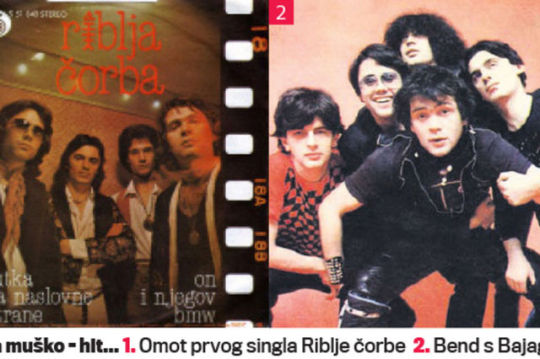
4 Maljčiki – Idoli, Vlada Divljan / Srđan Šaper
Trebalo je da Maljčiki budu parodija na socrealizam, na proletere koji su s jakim entuzijazmom u cik zore ustajali i odlazili radosni na posao, gradeći bolje društvo i državni sistem. I bila je.
Čulo se u Beogradu za neku grupu nekakvih talentovanih dečaka još prvih meseci osamdesete godine (prošlog veka, dakako). Čak su bili izdali i singl ploču (za ove mlađe, USB generacije, to vam je ploča na 45 obrtaja u minutu, samo manja od one velike – LP – a šta je gramofonska ploča, proguglajte, da ne gubimo vreme). Dakle, pročulo se da su se pojavili nekakvi Idoli i da mnogo dobro zvuče, a tek što su im pesme hitovi – to tek da čuješ!
Idoli su počeli furiozno. Zvanično su nastali marta 1980, a već posle mesec dana objavili su malu ploču. Na A strani bile su pesme Retko te viđam sa devojkama i Pomoć, pomoć, a s druge, B strane, recitacija/poema Poklon. Tu ploču, sa tri pesme, izdao je tada popularan časopis Vidici, besplatno, kao poklon čitaocima. Nedugo zatim, tadašnji zagrebački „Jugoton“ zove ih i objavljuje im singlicu, na kojoj su na B strani Maljčiki.
Legenda kaže da je pesma koja ih je onako baš, baš izdigla, pesma posle koje su za Idole čuli u svakom sokaku – ti čuveni Maljčiki (u prevodu, Dečaci) – da je ta pesma imala stihove:
Kakane zore bude me iz sna, kakana jutra, kakan sam i ja…
Od Vardara pa do Triglava…
Za ovo nije potreban prevod. E, ali je bio potreban cenzor, i to u „Jugotonu“, koji je od Vlade Divljana, Srđana Šapera i ostatka ekipe tražio da se stihovi – promene. I tako su, opet kaže legenda, kakane zore postale – plamene!
Plamene zore bude me iz sna, fabrička jutra, dim iz dimnjaka…
O, da! I tu je i takvu pesmu znao svako od Vardara pa do Triglava. Nije morao da se ima gramofon (to je sprava za reprodukciju zvuka s ploča, velikih i malih, op. aut.), dovoljno je bilo imati tranzistor (to je isto kao ovo danas na pametnim telefonima, samo bez slušalica. I sa OVOLIKIM baterijama; koje su trajale i po sedam dana!). Dakle, dovoljan je bio tranzistor jer nije bilo radio-stanice koja je držala do sebe a nije puštala Maljčike.
Baš nekako sovjetski
Retko te viđam sa devojkama i Pomoć, pomoć bili su hitovi, već je publika bila čula za te neke Idole, pevušila se ova prva, neobična pesma gde god, bila je i na top-listama i po radio-stanicama, ali su Maljčiki postali hitčina koja se čula do krajnjih granica Sibira.
Klincima je ponuđeno nešto novo, nešto što nije klasičan jugoslovenski rokenrol, ma šta to danas značilo, već pesma koja ih je prodrmala. A prodrmala je i starije generacije – onog prosečnog proletera, koji je bio preponosan na preduzeće u kom radi. To se tada zvalo RO – Radna organizacija.
E, ali tadašnji proleter, junak socijalističkog rada, nije znao sprdaju li se to Idoli sa socijalizmom, radom u fabrici ili šta? Nije da je pesma loša, čak je i melodija onako baš sovjetska/komunistička, pevljiva je, vesela i to, ali… Gde to ima da tamo neki zabavnjaci pevaju pesmu o radu i radnom čoveku? Kad ono – eto, ima!
Divljan i Šaper su želeli, kaže priča, da naprave svojevrsnu parodiju na tadašnji socijalistički realizam, na junake socijalističkog rada, na likove koji bi dali – ako treba – i život i platu i regres i trideset dana godišnjeg odmora (!) samo da državi, odnosno zajednici, bude bolje.
Čini se da su uspeli.
A pesma je i dalje aktuelna. Još ovom zemljom jedan udarnik udarnički – ali ne kao da je udaren! – ide i peva: Visoke peći potpaljujem ja!
Okej, važno je pomenuti i da su Idole činili Vlada Divljan (1958-2015), Srđan Šaper, Nebojša Krstić i Zdenko Kolar (kao ključna četvorka), ali je važnije to da su pesmu kojom su pokušali da nas probude iz sna napisali, udarnički i zajednički, Dečak Vlada Divljan i Srđan Šaper.
U VREME KADA JE ŽELEZARA RADILA
Plamene zore bude me iz sna,
fabrička jutra, dim iz
dimnjaka,
pesma se ori, mladi radnici,
čelična jutra,
hitam fabrici
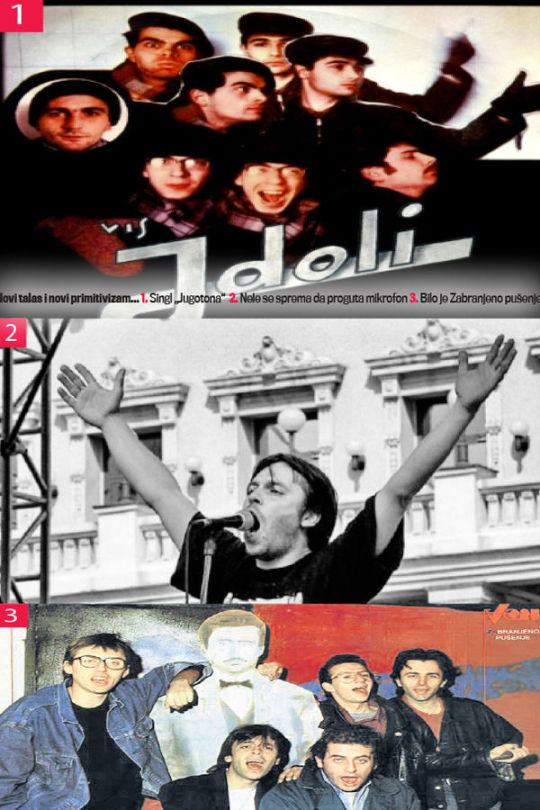
5 Zenica bluz – Zabranjeno pušenje, Dr Nele Karajlić
Došli su iz garaže, uzeli instrumente, Onaj Prorok Sa Velikim Ustima zgrabio je mikrofon i onda su stali na binu i rekli: Sad ćete da vidite kako se zajebava
Napišeš pesmu – u ono vreme, u onoj i onakvoj Jugoslaviji – kako ubiješ čoveka koji ti je, s oproštenjem, krečo ženu i to postane hit nad hitovima!
Zabranjeno pušenje je, kad se sa albumom Das ist Walter pojavilo na pozornici – a bilo je to sredinom 1984. godine – razbucalo u paramparčad dotadašnju rok muzičku scenu SFRJ. Niko nije znao šta nas je snašlo! Bile su to neke teme do tada neotpevane. I neopevane: pesma o rudarima, na primer (Put u središte rudnika Kreka Banovići), ali je sve rasturila Zenica bluz, jedna pesma veoma vesele melodije koja govori o tome o čemu govori. Ubiješ, osvetiš se, odležiš, a Hakija, taj koji je zbog krečanja tuđe žene morao biti ubiven, neće se vratiti sa Bara, jer se s centralnog sarajevskog groblja niko nikada nije vratio. Pod uslovom da je tamo odnet kao mrtav čovek. Niko se mrtav ne vraća ni sa jednog groblja, to je valjda jasno.
A jasno je valjda i da je jedna takva grupa, s jednom takvom montipajtonovskom pesmom, morala da postane popularna na Balkanu, gde je čakija, pa ajde da tako kažemo, nacionalni instrument.
Kakav pevač
I dok je onaj deo Juge koji preferira rok tih godina bio uljuljan pesmama EKV, Partibrejkersa, KUD Idijota, pa i Riblje čorbe, Parnog valjka i Atomskog skloništa, iz Sarajeva je tutnjalo nešto što se zove Zabranjeno pušenje. Sa svojim pogledom na stvarnost.
Manje-više, sve gore pomenute grupe imale su kvalitetne pevače, koliko to rokenrol zahteva, samo je čovek od kog je pretila opasnost da na svakom nastupu proguta mikrofon koliko je kao Džeger zevao (dok je pevao) bio sve samo ne – pevač!
I taj glas… taj glas Nenada Jankovića, alias Dr Neleta Karajlića… pa to je bio sve samo ne glas pevača! Tipično pankerski, ali na sarajevski način. Njuprimitivno. Što se odlično primilo u celoj Jugi, ali sa zadrškom. Jer nisu odmah svi ukapirali šta je to pesnik iz Sarajeva hteo da kaže.
A imao je da kaže mnogo toga. I ima još: eno ga sad piše knjige i vesti kažu da mu odlično ide. Vidi pod Fajront u Sarajevu („Laguna“).
No, da se vratimo pesmi koja ga je održala (njojzi hvala). Priča kaže da Zenica bluz čak nije ni trebalo da se nađe na tom prvom albumu. Ali se, ipak, nekako našla. I nije da se bez Zenice Pušenje ne bi vinulo među popularne i slavne, ali je sa Zenicom probilo oblake. Nema te top-liste rok muzike u bivšoj SFRJ na kojoj 1984. nije bilo ovog hita Zabranjenog pušenja.
Koje je u jednom momentu baš bilo zabranjeno.
Ono kad je – a to valjda svi koji koliko-toliko prate rok muziku na ovim prostorima znaju – Nele na koncertu u Rijeci rekao onu čuvenu: „Crko maršal“, a dušebrižnici rekli: „Aha, to vređaš Tita, e nećemo tako!“, i onda je Zabranjeno pušenje cenzurisano do daljeg.
Izvukli su se neku godinu kasnije, kad su valjda svi shvatili da je Tito stvarno umro i da nije jedini maršal na svetu. Postoji i firma muzičkih instrumenata s tim činom.
Tužna je naša sudbina
Iza Pušenja ostala je gomila pikavaca, čitaj hitova, koji će nadživeti i sve buduće ratove. Ako ih, ne daj bože, bude. Jer primitivaca koji to žele i priželjkuju uvek je bilo i biće. Ipak, danas, srećom, duvaju/pušu vetrovi mira.
Danas je pušenje zabranjeno skoro svuda. I tek će da bude. I to je Dr Nele Karajlić predvideo još pre trideset i kusur godina, nazvavši grupu Zabranjeno pušenje. A svi mislili – on se zeza.
KO PREŽIVI…
U Zenicu kada pođem ja,
prati me
pet-šest
drotova.
Okružni sudija reko: „Dvanaest godina,
dvanaest
godina strogog zatvora“.
#ex yu rock#tekst#pesme#tako ti je mala moja kad ljubi bosanac#maljciki#računajte na nas#lutka sa naslovne strane#zenica blues#jugoslavija#bivsa jugoslavija#odrastanje
50 notes
·
View notes
Text
Maybe you're someone else,
someone you don't even know.
If you kept thinking about it, just
the thought would devastate you.
Semezdin Mehmedinovic’s “Zenica Blues” in Sarajevo Blues
5 notes
·
View notes
Text

Cut my hair
29 notes
·
View notes
Note
Everyone should mind their own fucking business if they see me drunkenly crying to Heroj Ulice and Tu noć kad si se udavala by Prljavo Kazalište. Also everyone should mind their business if they see me drunkenly doing the choreo for Suada by Plavi orkestar and zenica blues by zabranjeno pušenje.
Gods the exquisite ex-yu/slav/balkan energy is strong tonight, boys
you are so fucking valid, anon
8 notes
·
View notes
Text
7 notes
·
View notes
Text
Dodan još jedan koncert Zabranjenog pušenja u sklopu 'Sviraj stare'
Dodan još jedan koncert Zabranjenog pušenja u sklopu ‘Sviraj stare’
Zbog ogromnog interesa i sjajnog tempa prodaje ulaznica za nastup Zabranjenog pušenja u sklopu programa Sviraj stare, nadodan je još jedan koncert. Uz planiranu svirku u petak, 23. ožujka, sarajevski rock fenomen nastupit će u Vintage Industrialu i u nedjelju, 25. ožujka.
(more…)
View On WordPress
0 notes
Photo
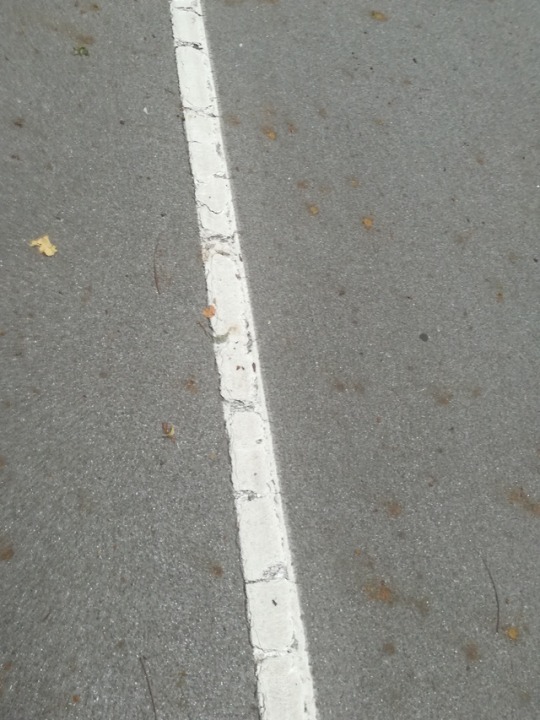
DIE HEIMAT Lettre à Arnaud
Graz, le 24 juin 2019
Mon cher Arnaud,
je suis désolé de ne pas avoir pu t’écrire plus tôt. Ayant relu ta dernière lettre ce matin (une bonne semaine après la réception!) j’ai décidé, sur-le-champ, de t’écrire une lettre véritable, oui, sur le papier, à la main, et par-dessus le marché en marchant ! La preuve ?
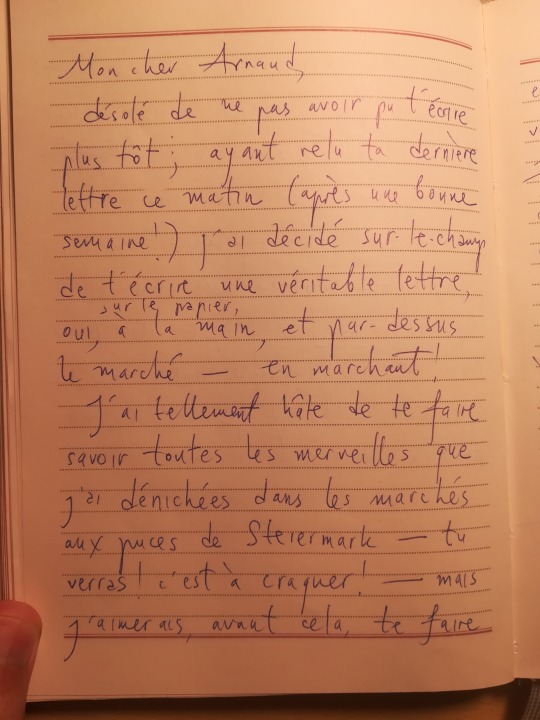
J’ai tellement hâte de te montrer toutes les richesses que j’ai dénichées dans les marchés aux puces de Land Steiermark! Mais avant cela, j’aimerais te faire entrer tout doucement dans cette ville de Graz, tout comme l’avait fait Michel Butor dans l'Emploi du temps, en introduisant son lecteur pas à pas dans son Manchester imaginaire (tu peux t’imaginer, c’est le bouquin que je suis en train de traduire!).
Le premier spectacle qui s'est offert à mes yeux ici à Graz, le soir même de mon débarquement, c'était une vieille femme, postée devant la parfumerie Orsay, et qui ne mendiait ni amusait le public, mais se plaisait à lui tenir un discours en pur serbe (à l'accent de Herzégovine); j'ai réussi à en intercepter quelques paroles que voici, pour tes oreilles : Je vous le baise bien, votre sang hitlérien, et je vous le baise encore sur un bûcher ! Allez le mettre, votre Hitler, dans le trou de cul, tous parmi vous!
(Je te dirais comment ça sonne en serbe. Si j’avais vu ça dans un bouquin, cela aurait l’air trop forcé et ridicule! Pourtant c'était comme ça dans la vraie vie : elle a même prononcé deux synonymes pour baiser ). Pour couper court, c'est en ce moment, cher Arnaud, que je me suis rendu compte que j'étais chez moi !
Et c'était seulement la première apparition de la Heimat. Il y en aura, s'avérera-t-il, d'autres apparitions vertigineuses, macabres même ! Lors de mes premières promenades fortuites (fortuites dans la mesure où le permet le plan urbanistique de la ville) dans la vitrine d’un antiquaire près du Jakominiplatz, j’ai surpris une carté du 19e siècle de la Bosnie (qui à l’époque était occupée par l’Empire Autriche-Hongrie) et des terres autour de celle-ci. J’y ai reconnu la ville de Valjevo, où j’ai passé quelques années avant l’école élémentaire (ici appelé Valiova), Kragujevac (Krakoiewacz) et Serraglio. Celle-ci est Sarajevo.
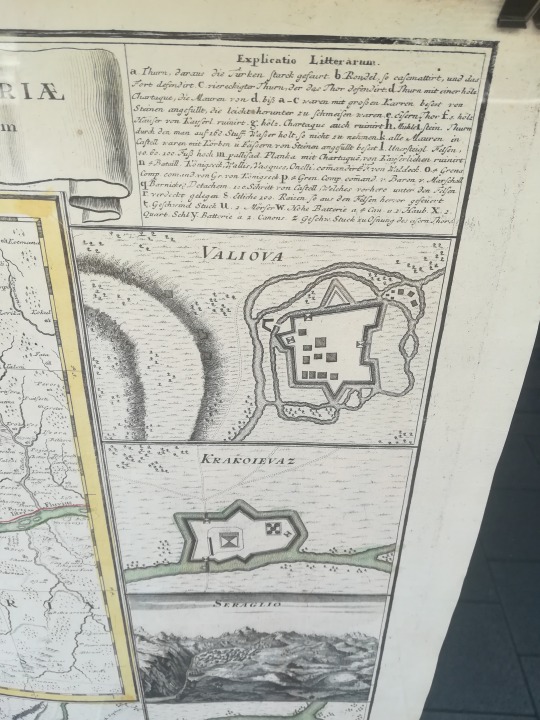
Puisque nous y sommes, à Sarajevo, quelques jours plus tard, le quinze, j'ai passé à Volkshaus, une salle où le Parti communiste local (on m'a dit qu'ils étaient sérieux) avait organisé une Fête yougoslave (annoncée, aussi en serbe, comme Yugofešta). De quoi s'agissait-il donc? Il ne s’agissait, rien de moins, que de tenir des concerts des groupes de folklore pendant toute la journée de ce 15 juin, arrosés par des litres de bière Puntigamer et finalisés par le concert du groupe Zabranjeno pušenje. Tu n'en as pas entendu parler? Eh bien, dans les années 1980, ce groupe rock de Sarajevo était le seul représentant du mouvement de néo-primitivisme (va voir ce que c’est). Ses membres avaient réalisé le meilleur show de télé comico-satirique yougoslave qui s’appelait Top lista nadrealista (Liste top des surréalistes : ils n'avaient heureusement rien à voir avec Breton et co.). Un groupe culte, donc, que je retrouve trente ans plus tard à Graz, et ce lors de la fête des jeunes communistes styriens. Et c'était comment le concert ? Eh bien, franchement, je ne me souviens pas; ou à peine : je me souviens de quelques mesures de la chanson Zenica blues (leur réplique très drôle à Folsom prison blues de Johnny Cash; regarde : ils ont l’air tout réjoui) et de Šeki’s on the road again. J’ai raté la plupart de leur concert car j'étais occupé à acheter de la bière. Un premier verre (plastique) de Puntigamer a pris une bonne trentaine de minutes de se transformer dans une gorgée et c’est alors que j’ai su que ce sera le seul verre. Ensuite, posté sur un escalier, je devais éviter la fumée. Quelle fumée ? Celle provenant des grilles spécialement aménagés pour l'occasion. Là on pouvait acheter des spécialités balkaniques, comme cevapcici, sarma, pleskavica, accompagnés tout comme il faut par des oignons. Bref, rien que de la meat is murder, avec un peu de choux, et tout cela dans un lieu appelé Dolly Bell, d'après le premier film d'Emir Kusturica.

J’étais, je t’avoue, pleinement déçu par ce spectacle nostalgique, organisé en plus par un parti communiste. J’y ai flairé une naïveté énorme, tout près de celle qui a poussé Peter Handke (à tous les égards mon écrivain bien aimé) de plaider pour Slobodan Milosevic en tant que sauveur de cette même Yougoslavie !
Ou bien cette parade du Parti communiste était une perspicacité de business (ça marchait bien lors de cette soirée) ! On n’échappe à la naïveté d’une Heimat du communisme-soft, western-friendly, surtout dans cette époque néolib. où ce communisme est transformé en marque commerciale (fût-ce dans une grille de cevapcici à la Sarajevo). Un communisme comestible.
Pourtant, toutes les réserves prises en compte, le sentiment de reconnaissance d’un chez-soi a continué et s’est sensiblement accru quand j’ai, nous y sommes enfin, rendu visite au marché aux puces. Les plus grandes puces de Graz sont organisées dans la banlieue de Puntigam, tout à côté de la brasserie de la Puntigamer. Et le premier livre que je me suis surpris à prendre dans une boîte cartonnée et d’ouvrir, mais non, que j’ai retrouvé ouvert (tu te souviens qu’autrefois j’étais passionné de livres!); qu’est-ce que tu penses que c’était ? La première page de Sur le pont de Drina d’Ivo Andric, que tous les Yougoslaves connaissent par coeur. La preuve? La voici.
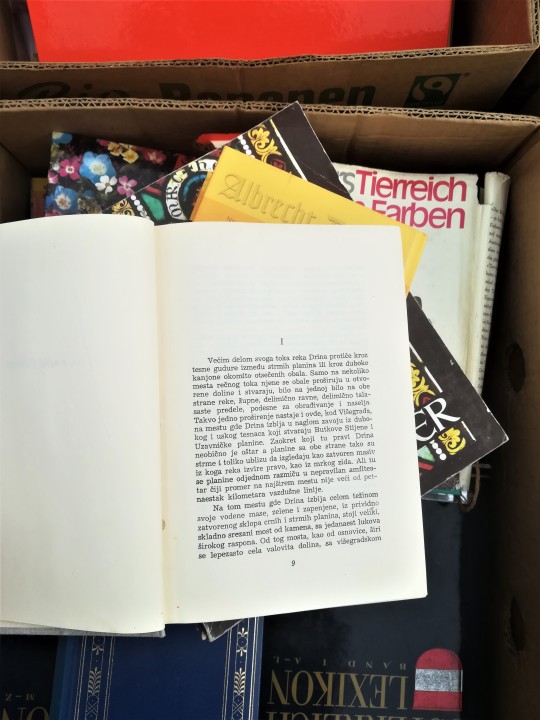
Mon dieu, Arnaud, la vie n’a commence qu’alors, à la vue de ces banlieues !
Il faut dire que, grâce à la bourse de cette institution locale de Kulturvermittlung, je profite (mais seulement durant un mois) d’un logement somptueux qui se trouve au centre-ville, tout en haut de la colline de Schlossberg, là où tout le monde veut monter, et payer 1.60E pour le faire, et au spectacle duquel une Bosnienne a, il y a quelques heures, dit à son petit ami : Prvo pa muško ! c’est-à-dire : Le premier lieu que tu me fais visiter et il s’avère que c’est un Bingo! Le voici, ce Bingo.
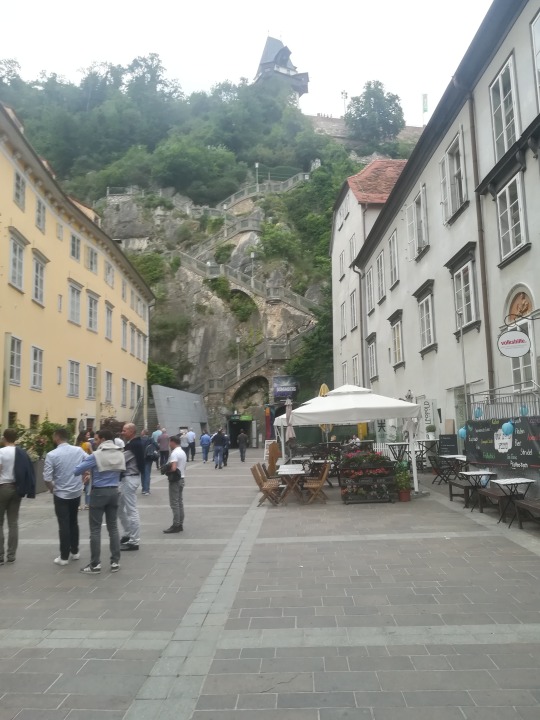
Cela doit être la vue la plus connue de cette ville. Les habitants de Graz doivent en avoir marre. Mais moi aussi ! Tout en ne voulant pas me montrer irrespectueux vis-à-vis de cette institution qui me prend pour un écrivain (vois-tu?), j’ai attendu impatiemment ce samedi, j’avais hâte à laisser derrière moi toutes ces façades somptueuses, tout ce luxe blink-blink pour les yeux touristiques (dont je ne me lassais pas à imaginer les coulisses) et de rejoindre la bienheureuse banlieue, les quartiers louches (chelous), les pavés défoncés, les mines crispées, tout ce qui n’était pas fait pour l’oeil de celui qui est en train de passer, mais pour le corps de celui qui y restera, pour un résident, oui, et c’est ce que je suis, jusqu’au début du mois de juillet au moins, un écrivain-résident, pas un écrivain-touriste! Donc, je mérité de m’y rendre !
Ainsi me suis-je pressé pour arriver à Puntigam ce samedi matin (avant neuf heures), ayant pris le tram numéro cinq à partir de Schlossbergplatz. Devant un Cineplexx (il ne s’agit pas de celui passant les films porno; nous sommes dans une époque où ce double X veut dire luxe), une centaine de vendeurs avait déjà déplié leurs ballots.
Et, tout comme Luise G., organisatrice de cette résidence, m’a chaleureusement prévenu, il y avait des Serbes. Il y en avait beaucoup. De Yougoslaves, de Yougos en général. C’était comme sur mon marché aux puces natal (pourrais-je dire natal? je le pourrais!) de Zemun. Je passais les trajectoires à côté de Cineplexx dans tous les sens, je veux dire ces boulevards entre les marchandises, en écoutant la musique des accents pour la grande plupart bosniaques ou dalmates, avec quelques étirements slovènes. J’en ai tiré pour toi ce bref échange entre un vendeur et un acheteur, ayant pris les tenailles de son ballot :
Jesi našo nešta? Ja ! Ta ti je odlična, zube da izvadiš!
(T’as trouvé quelque chose ! / Ouais ! / Celles-là, elles sont excellentes même pour t’arracher les dents!)
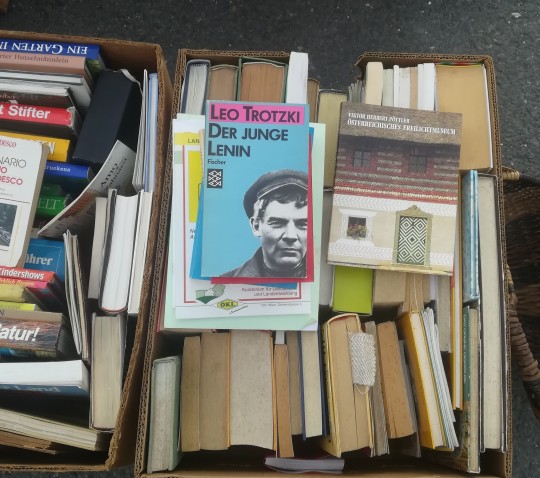
Encore un spectre de Marx dans la boîte dans l’édition de Fischer ! Mais revenons à nos moutons, à nos moutons musicaux je veux dire ! Lors de cette première randonnée à travers Puntigam, j’ai beaucoup vu et écouté, mais il n’y avait pas grand-chose à acheter. C’était simplement un samedi faible. J’en serais rentré les mains vides et tristes si un Yougo n’y avait pas surgi du sol avec deux boîtes pleines de disques.
Y ayant déniché Harvest de Neil Young parmi de nombreux LPs allemands (surtout lisses! glanz!), je ne me suis pas adressé en serbe au patron. Ah non ! Dieu m’en garde hors de l'ex-Yu ! J’ai posé la question apprise par coeur quelques mois avant d’arriver ici : Was kosten die Platten? Quelle en fut la réponse ? Ein Euro. Sans discussion même ! C’était mieux qu’en Serbie. (Dans la photo qui suit, tu verras le disque confronté au celui de Pearl Jam des années 1990, Vitalogy, l’album que j’ai traité de ‘fils’ de Harvest)
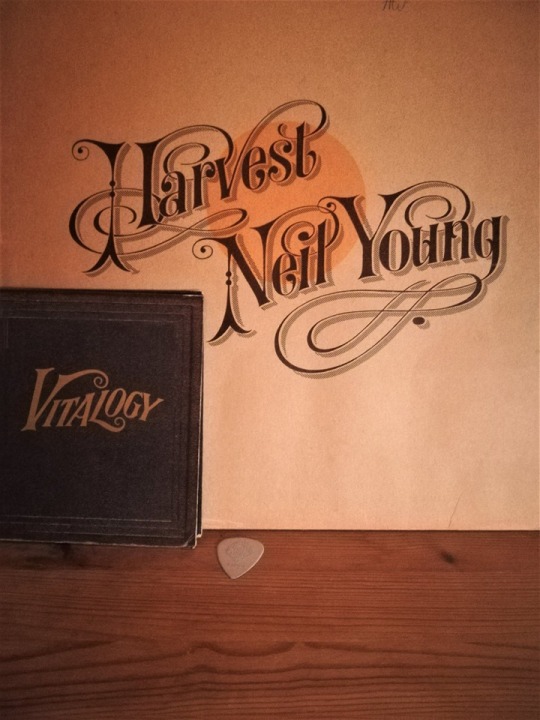
Pour faire une comparaison, deux Plattenladen de Graz que j’avais déjà visitées avant Puntigam vendaient leurs disques usés pour minimum 10 euros. Ceux qui étaient proposés pour 3 ou 5 ne valaient strictement rien; parmi eux j’ai vu un McCartney.
Mais c’est dans Dux Records au quartier Lend que j’ai trouvé un disque formidable : la première édition soviétique des singles précoces des Rolling Stones. Son titre? Игра с огнем/ Play with fire.
Je l’ai montré à mon voisin de Géorgie, Zviad : il a failli pleurer à la vue de cette couverture. Cela a dû le rappeler sa jeunesse. Le disque avait paru en 1989.
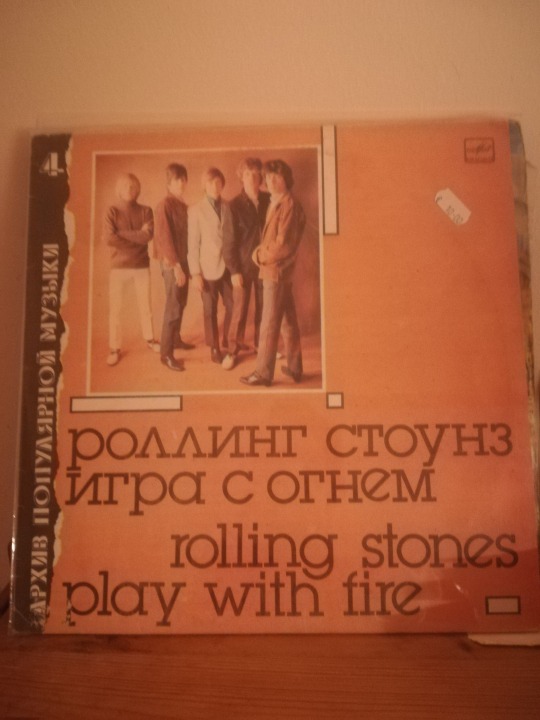
Je ne l’aurais, pour ma part, jamais pris si j’avais déjà “Play with fire” dans un de six ou sept LP que je possède de RS; Play with fire est pour moi de loin leur meilleure chanson. Chez un autre disquaire, avec un nom allusif, Inandout Records, j’ai déniché le troisième album de Stranglers, Black and white, où se trouve aussi ma chanson favorite de ce groupe, Nice’n’Sleazy.
Dix euros seraient donc rien pour un résident de Graz, en matière de disques. Et les nouveautés, encore en emballage ? Cela ne dépasse pas 20 ou 25 euros. Je me suis souvenu encore une fois de ce disquaire de Belgrade, Yugovynil, qui vend toujours les nouveautés pour des prix dépassant 30 euros. Il est situé dans le centre d’un café-quartier récemment gentrifié de la rue Cetinjska, donc bien adapté aux poches de cette jeunesse posh qui peut bien se les acheter et se les mettre sur leurs... Insta. (Bien sûr, j’ai rencontré leur chef au marché aux puces à Zemun à maintes reprises, achetant ses disques pour 1 EUR maximum pour les revendre à des prix hors commun, sans taxe!)
Revenons à Graz (qui, comme nous avons dit, n’est pas tellement ailleurs!). Une semaine plus tard, le 22 juin, je suis entré dans le tram 5 de bonne heure. Une inscription dans le tram donnait à lire, en slovène : Danas velja vsaka vozovnica kot dnevna karta do 24 H. “Aujourd’hui, tout ticket de transport sera valable comme le ticket journal, jusqu’à 24 heures”.
Pourquoi donc ? Ce jour-là, comme je le saurai plus tard, c’était le jour de Pride.
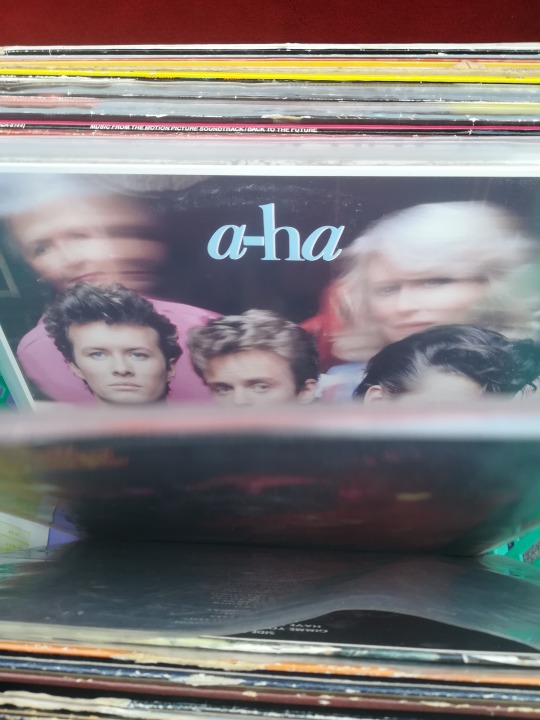
Cette fois, donc, Puntigam était plein à craquer. Un Slovène vendait des disques que tu me vois ici feuilleter. Ils coûtent combien? - ai-je demandé en allemand. Pourquoi je n’ai pas parlé slovène? J’ai toujours eu envie, mon cher Arnaud, de pouvoir me promener quelque part où tout le monde parle ma langue sans savoir que je peux les comprendre. Le Slovène était pourtant plus raffiné que le Yougo d’une semaine d’avant. “Chaque disque a son prix!” “Beatles 1967/1970?” “20 euros” “Come Together single?” “10 euros” Ah, le voilà, il était aussi un Beatles fan. “Talking Heads, Little creatures?” “6″. “Danke”.
C’est que j’attendais trop, mon cher Arnaud. L’Autriche est quand-même le pays capitaliste le plus proche de nous, les Balkaniques. Dans les années 1980, que j’apprécie tout comme toi, je m’imaginais un bon nombre d’Autrichiens ayant parmi leurs disques les albums et singles des Television, Pixies, Sonic Youth, Dinosaur Jr., Gun Club, Siouxsie and the Banshees, et j’en passe, et même dans les années 1990, où cette maladie de CD avait déjà pris le dessus.
Mais, hors la façade de ces DUX RECORDS, faite d'après la couverture de l’album Goo de Sonic Youth, hors quelques conneries habituelles de ces années trouvables même à Belgrade, il s’est avéré que nos marchés aux puces respectifs sont, de ce point de vue, absolument contemporains : leurs disques proviennent aussi pour la plupart des années 1960/1970, tout au plus jusqu’à 1980.
Donc, ce 22 juin, un jour après le solstice d’été, un jour après la promenade de Cléo de 5 à 7 dans le film d’Agnès Varda, je m’arrête devant quelques boîtes de disques. C’est une Yougoslave qui vent. Je lui demande dans mon bas-allemand: Was kosten die Platten? Elle me répond d’une façon compliquée, je n’arrive pas à saisir un mot, Arnaud, pourtant je fais oui de la tête avant de poser une question supplémentaire Für eine Stücke? (Pour une pièce?), sur quoi elle me fait: Drei euro.
Je m’y mets et j’en déniche le soundtrack pour un des films les plus drôles de ma vie, My fair lady (oui, je sais que c’est peut-être hip maintenant, mais il s’agit d’un musical, et, tout comme pour Hair, je n’en aime que le tracklist!). Et ensuite je dis Danke et continue à marcher sans rien acheter.
C’est alors que je rencontre Ada Kobusiewicz. (Si je ne t’en ai rien dit jusqu’à ce moment-là, c’est que j’ai voulu que tu la rencontrasses en lisant!) Ada est une artiste visuelle qui fait aussi des films et qui est auteure d’une exposition actuelle dans Schlossbergstollen (Tunnel pour les piétons); Illusion, basée sur les effets de lumière et de couleurs. Elle avait passé quelques années en Serbie et j’ai eu l’occasion de voir ses photos du marché aux puces de Novi Sad, appelé Nylon. Je te montrerai à Arles cette série de photos qui s’appelle Fleeting Installation (2014).
Donc, je rencontre Ada qui me dit s’être procuré de quelques vêtements. Pour combien, je lui demande. Pour 10 centimes pièce! Va voir ! La pluie commence. Je cours immédiatement chez la Yougoslave, demande en bas-allemand si ce serait possible de prendre My fair lady pour 2 euros, et quant au Slovène; si je pourrais avoir Talking Heads pour 5. La pluie devient forte. Mon prix balkanique est immédiatement accepté. Revenu chez moi (de chez moi? je suis toujours chez moi !) je découvre que l’album de Talking Heads est une édition de Jugoton, le disquaire yougoslave le plus important, de Zagreb.
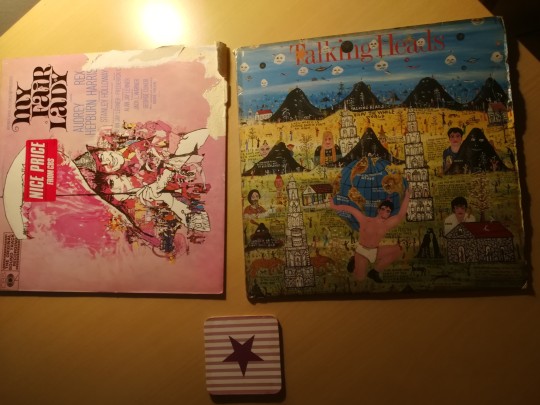
Alors, Ada me montre l’intérieur de ce fameux Cineplexx. Là il s’avère que c’est encore plus riche que je ne m’imaginais. Tout en jurant parce que je n’avais pas sur moi de sac supplémentaire, je me surprends à boire un café mit zunehmen, pour la première fois dans un marché aux puces. Pourquoi ? Bah, simplement, ils ont des bancs où s’asseoir, où l’on peut même supporter la pluie.
Est-ce donc si facile de se faire servir? Oui, et marcher avec un café, mettre son verre en plastique chaque fois devant une boîte pleine de disques ou de livres bon marché et le retrouver intact.
Et puis, se reposer sur un de ces bancs en attendant Ada et en regardant un Chinois content, s’étant muni d’un ventilateur.
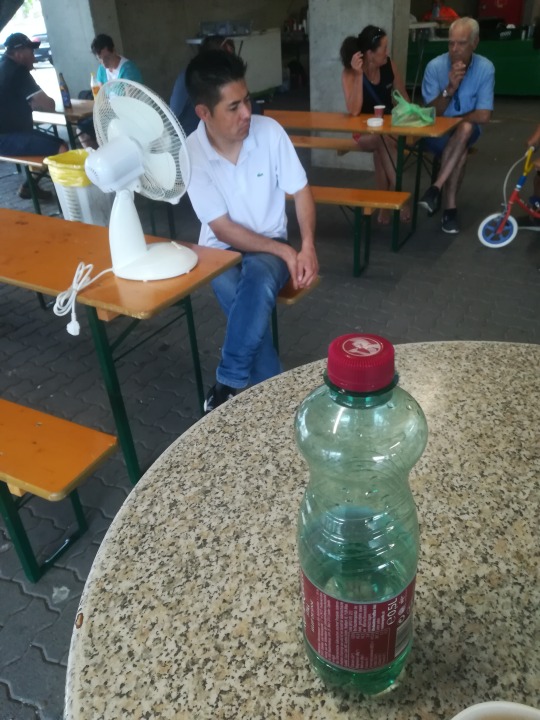
Après cela, toujours guidé par Ada, je vais visiter une boulangerie spéciale qui revend le pain de la veille. Mais ce n’est pas un bäckerei comme les autres, Arnaud; ici, au centre ville, à Lend, à Mariahilferstrasse, il s’agit d’un concept-store, dont la vitrine te dira tout !
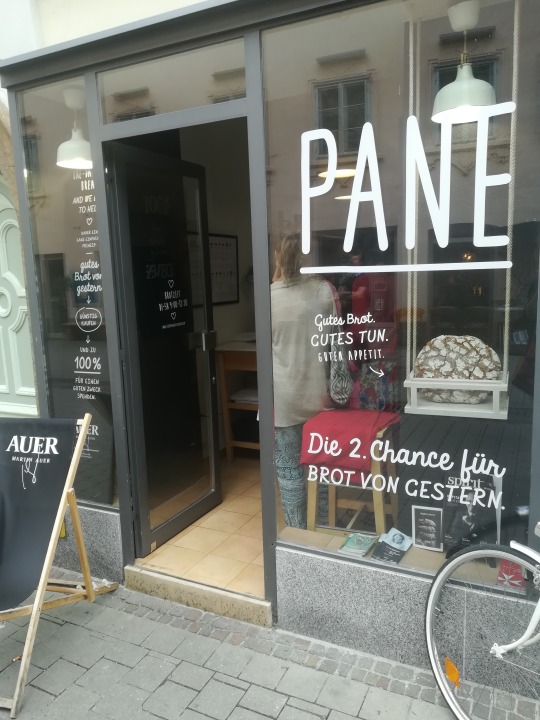
Donc, au moment où je commençais la lettre que je te destine, j’étais à Sackstrasse, où, à 17h40 précisément, une camionnette jaune s’est arrêté au milieu de la rue. Il en est sorti un employé avec une corbeille orange. Il s’est approché d’une grande boîte jaune d’en face, a mis sa corbeille dessous, et ayant ouvert le fond de la boîte, il en a fait tomber une pile de lettres.
Cette lettre t’arrivera beaucoup plus tôt que celles-ci, ramassées dans la corbeille du facteur, mais j’espère que tu ne m’en voudras pas ! C’est quand même d’une HEIMAT que je t’écris là!!! Hein ! Je t’écrirai bientôt, surtout si je déniche un chanteur ou un écrivain italien pour tes oreilles.
P S Quant à l’alcool, le vin... le rouge, tu peux t’imaginer, c’est pas grand-chose. Des vins blancs? C’est mieux. A considérer leurs bières de près, on est plus optimiste qu’en France. Je suis décidément devenu fan de Gösser. J’en importerais sans doute clandestinement quelques-unes, cet été, à Arles.
J’espère que je ne t’ai pas assommé avec cette lettre énorme ! Mais il y a des photos aussi ! Et que tu ne m’en voudras pas que ce soit une lettre ouverte ! En attendant ta réponse (épique comme d’habitude) !
Bojan
#arnaud#graz#lettre#français#puntigam#kpÖ#zabranjeno pusenje#heimat#zenica#valiova#serraglio#ada kobusiewicz#rolling stones#talking heads#neil young#ivo andric
3 notes
·
View notes
Photo

#nature#zenica#bosna i hercegovina#tumblr#love#landscape#sun#sunrise#sunset#blue sky#sky#skyline#skylovers
2 notes
·
View notes
Photo

Zabranjeno Pušenje - Zenica Blues http://www.balkanedebiyati.com/zabranjeno-pusenje-ve-zenica-blues/
2 notes
·
View notes
Text
Poetry Feature: Aida Suljakovic
Aida Suljakovic was born in 1993 in Zenica. She spent her first years of life between Maglaj and Zenica. She graduated from the Faculty of Philosophy in Zenica, Department of Literature and Language.
During her studies, she was an active member of different literary and poetry organisations such as this Aurora Borealis and Euterpe.
After graduation, she moved first to Switzerland, then she also spent short periods abrouad: in Cardiff (United Kingdom) and San Francisco (USA).
When she moved back to Switzerland, she started a Master's studies at the Institute for Slavic Language in Basel.
She writes poetry and prose in Bosnian; part of her published works are also translated into English.
Her poetries are published in "Život", "Poezija - a journal of poetic practices", and on portals like "P.E.N.BiH" and similar.
Here Aida shares with LFF a series poem.

A postcard from you
On the bridge stands a woman
In persona, the goddess Parvati.
Spreading before here, are three males
With a dance which resembles
a cherry.
***
Within a semi-dark room, I lay, semi-covered
And with squinting eyes, half-open, I watch the new moon
Through the half-open window
I ponder about the glass
of which I cannot ascertain is
half-full or half-empty
And, maybe I also wanted to say something else.
Beginning
They stand, right over there beside the lotus mats
Two slippers.
On them an inscription
Skillfully embroidered with emerald stars
“Really, Is the one who knows and the one who does not, the same?!”
Exiled
Thousand words
Mostly profanities, cursing
Holy word quotes and beautiful literature
Many years later facing the shooting squad
Aureliano Buendi’s Colonel will remember this early
summer afternoon when his father brought him along to see ice, for the first time
Time is for revolution
Landscapes are passing
Spring is awakening
Eros, is being kept up, by me
One picture, thousand words
Chess figures
James Bond
Laying on sand
Totally oriental
Desert fragrance
Instruments full of strings
Voices which chase away the tears
Uncovered I lay in a cold room
I am a desert
I am many things, many grains
And thousand words
News from home
exile make harder
Far away somewhere
Japan is awakening
Chile goes to rest
Internationals dream new beginnings
In the lower part of the mirror
Layer of love, gently, falls to the floor
… Dear God, how come a dandelion in the desert?
Stars
Butterflies
Memories of ice
Coffee
Rug
Saber
Moon
There is no more fire nor ice
Only the conductor calls out Saraj’vo
And gazes somewhere in the distance
***
If I were a farm girl with rosy cheeks
I would wear a garland in my hair
And sincere love in the early dawn
If I were a makeup artist with rosy cheeks
On the slopes and fields in the Krajiska valleys
I would most surely have a garland in my hair
Return
Love has stopped in my throat
For to the heart arrive it could not.
I love our silence which squeals
The entire afternoon, I imagined I saw Frida
And here new, up until now best, self-portrait.
For a moment, I imagined
I could also see, Simonida without her eyes
Or is it rain on the window
Her tears begin
I felt also the breath on my astonished neck
That must have been Maestro!
With his tongue he licked my ear
And then vanished without trace. Into the abyss.
Scratching/Clawing
The cobblestones walk, runs, and sometimes
Only stroll.
At night,
She dreams how on her face someone urinates
She dreams,
how she fucks everything his
Alas, But, on first glance/up close
A virgin
Massive
And now defies the human body
An hour I am the same, I think,
I saw it on a happy man
who last night danced to folk songs
On the hill which is
Tomasica called
A dream; leaving Belgrade
The blue, which used to beautify the
heavenly horizons, has fallen in twilight
Somewhere in florida, a man steadily
smoked a cigarette
But she woke up completely wet,
In the middle of the night, orgasmic.
-
Find Aida on IG @aidaSuljakovic
~
Les Femmes Folles is a volunteer organization founded in 2011 with the mission to support and promote women in all forms, styles and levels of art from around the world with the online journal, print annuals, exhibitions and events; originally inspired by artist Wanda Ewing and her curated exhibit by the name Les Femmes Folles (Wild Women). LFF was created and is curated by Sally Deskins. LFF Booksis a micro-feminist press that publishes 1-2 books per year by the creators of Les Femmes Folles including the award-winning Intimates & Fools (Laura Madeline Wiseman, 2014) , The Hunger of the Cheeky Sisters: Ten Tales (Laura Madeline Wiseman/Lauren Rinaldi, 2015 and Mes Predices (catalog of art/writing by Marie Peter Toltz, 2017).Other titles include Les Femmes Folles: The Women 2011, 2012, 2013, 2014, 2015 and 2016 available on blurb.com, including art, poetry and interview excerpts from women artists. A portion of the proceeds from LFF books and products benefit the University of Nebraska-Omaha’s Wanda Ewing Scholarship Fund.
Current call for collaborative art-writing: http://femmesfollesnebraska.tumblr.com/post/181376606692/lff-2019-artistpoet-collaborations
Current call: What does being a womxn mean to you? http://femmesfollesnebraska.tumblr.com/post/183697785757/what-does-being-a-womxn-today-mean-to-youyour
0 notes
Photo

Yugotones: Balkan Communist Pop and New Wave
Part six of seven (probably). Parts one through five can be found by clicking the tag “my mixology career” at the bottom of this post; probably wait until you’ve clicked through to the full post before you do that, though. (Yes, I am explaining Tumblr to people who are not on Tumblr.)
The YouTube playlist for this mix is here. The tracklist is below; my notes on the mix, the background, and the songs are below that.
Bebi Dol, “Rudi”
Xenia, “Troje”
Zabranjeno Pušenje “Zenica blues”
Data, “Neka ti se dese prave stvari”
Dorian Gray, “Za tvoje oči”
Borghesia, “On”
Idoli, “Bambina”
Film, “Boje su u nama”
Bastion, “Hollywood”
Slađana Milošević, “Ja sam neka čudna vrsta”
Bliski Susret, “Kao nekad”
Plavi Orkestar, “Suada”
D’Boys, “Mi smo D’Boys”
Denis i Denis, “Program tvog kompjutera”
Gjurmët, “Të shtrirë mbi kanape”
Zana Nimani, “Što ne znam gde si sad”
Paraf, “Fini dečko”
Crvena Jabuka, “Nek’ te on ljubi”
U Škripcu, “Siđi do reke”
Videosex, “Moja Mama”
Josipa Lisac, “Ja bolujem”
Yugotones: balkan communist pop and new wave
For a long time when I was planning these mixes, I was going to lump all of Eastern Europe together into one Behind The Iron Curtain mix. But the more I listened and read and understood, the less snugly that seemed to fit the facts. Not just because Yugoslavia had broken away from the Soviet-aligned Eastern Bloc in the 1960s, siding with Maoist China in the Sino-Soviet split, but because Yugoslavian media — print, radio, and television — did not wholly abjure the decadent West. State-owned record labels issued foreign and local beat groups in the 60s and prog and hard rock groups in the 70s, with the result that the Balkan punk wave hit roughly contemporaneously with the French, Spanish, Italian, etc. waves. (Meanwhile, in the Soviet sphere, Fifties and Sixties rock signifiers were only just starting to gain official approval, as we will see.)
There was, and is, far more complexity to the Socialist Federal Republic of Yugoslavia as it existed between 1945 and 1992 than I can hope to convey here, even if I fully grasped it all, which I don’t remotely. But put simply: ethnic tensions, especially between the richer, more populous, and administratively overrepresented Serbs and minority populations like Croats and Bosnians, were always high. The 1980 death of President-for-Life Josip Broz Tito, who came to power fighting Fascists in the 1940s, accelerated those tensions, and ghouls like Slobodan Milošević would take advantage of the power vacuum to stoke the flames of ethnic resentment: the horrific post-breakup wars of the 1990s, which are all most of us know about the Balkans, were far more the product of sustained propaganda campaigns than of any regional propensity for violence — indeed, propensities for violence are inculcated by means of sustained propaganda. (Which is how toxic masculinity, to choose an example not at all at random, operates.)
But very little of that grimness, tension, or rage is present within this music, which like much of the rest of European pop in the early 80s is both excited and wary about new technology, eagerly devouring the new and rummaging through the old to see what can be relevantly cannibalized, and giddy with its own creative strength. Although Eastern European and Balkan rock has since the 80s gained a certain reputation for seriousness, not to say dourness, that’s only partly true here — mostly, granted, because my own predilections privilege the froth and giddiness of pop rather than the grim chug of rock, but also because Yugoslav society (to the extent it was a unified society) was much freer and more open in the 80s than it had been for decades. The death of Tito functioned much like the death of Franco had in Spain: the old truths (and especially the old censorships) no longer held, and all kinds of material rose to fill a marketplace which had weathered thirty years of the Cold War better than any other in Eastern Europe.
In fact, you have to go to MTV in the Us or Top of the Pops in the UK to find as much solid pop-video work as there is in this mix: most of the biggest songs had several different videos, because there were a lot of competing pop shows on Yugoslav television and sometimes they each commissioned their own video.
There is still plenty of Communism represented in the mix, though: notably the predominance of the state record label, Jugoton, as the issuer of most of the music below. Variants mostly reflect the city of origin, to which point: Yugoslavia was a federation of six socialist republics: Serbia, Croatia, Bosnia, Slovenia, Macedonia, and Montenegro, as well as two autonomous communities within Serbia, Kosovo and Vojvodina. Linguistically diverse (Serbian, Croatian, Bosnian, and Montenegrin are all to some degree mutually intelligible, but Slovene, Macedonian, and Kosovar Albanian are not), ethnically and religiously heterogeneous, and with a long history of nominal administrative unity but distinct local practices, Yugoslavia represents the point in these mixes where my slender grasp on the languages in question fails entirely.
There are seven Serbian, seven Croatian, three Bosnian, two Slovene, one Macedonian and one Kosovar songs, not that I could distinguish any of them except diacritically. Albania, the Balkan socialist republic bounded by Yugoslavia and the Mediterranean, is not represented at all except linguistically (Kosovo is largely ethnic Albanian); state repression of non-folk popular music was enforced in Tirana until the 1990s.
I think that’s all the hedging I wanted to do. Although this project has been called a “deep dive,” I think of it much more as a surface skim. Anyone with the patience to click around on YouTube, fact-check against Discogs, and use Chrome’s translation tools could do the same. You can too. If you like anything you hear, you should.
1. Bebi Dol Rudi PGP RTB | Belgrade, 1983
We open with perhaps the most perfect pop song produced in Eastern Europe all decade: a valentine to Rudolph Valentino, sung by Serbian pop starlet Dragana Šarić. Her stage name is such deliberately infantilizing phonetic English that the breadth of her music, far from being lolita-esque dance-pop, can take the unwary by surprise. Her work was influenced by jazz, Arabic pop, and traditional Slavic folk as well as international pop: and despite its puppy-love lyrics, “Rudi” is structurally surprising, as she takes a basic pop song and unfolds unexpected harmonic filigree in post-chorus vocal flights. The voluptuous sweep of the melody fits in well with the plush erotic fantasies enacted on screen by Valentino: one video clip has Šarić intercut with scenes The Sheik, which helps elucidate the colonialist trappings of Western commodified (heterosexual) desire.
2. Xenia Troje Jugoton | Zagreb, 1984
What I always think of as the Blondie model of pop — a sharp pop-rock band fronted by a cool, attractive woman — was extremely popular in the early 1980s, and in Yugoslavia every major ethnicity had their own. Xenia was the Croatian version: singer Vesna Vrandečić was the singer, although on this single (“Three”) she cedes the chorus to the band’s guitarist and songwriter Robert Funčić’s laid-back almost-rap. Since it’s a song about the drama of men fighting over a woman, and the chorus is first-person from one of the men, it makes a kind of sense: but overshadowing both singers is the tense, blustery edge of the music, all paranoia and bluster, replicating the physical sensation of being in the room for such a fight.
3. Zabranjeno Pušenje Zenica blues Jugoton | Sarajevo, 1984
Although one of the smaller and poorer republics in the Yugoslav federation, Bosnia was one of the few to engender an honest-to-goodness local cultural movement (as opposed to merely imitations of Western models) in the 1980s. The “Novi primitivizam” (New Primitivism) that swept Sarajevo between 1981 and 1987 was a jocular proletarian reaction to the self-serious New Romanticism of British import (and Croatian popularization, as we will see) and Slovenian Neue Slowenische Kunst (we’ll see a bit of that too). Zabranjeno Pušenje were perhaps the foremost Novi primitivizam band: a folk-punk outfit like the Fugs or the Mekons, their music was characterized by local slang (often borrowed Turkicisms), simple melodies, and rudimentary instrumentation. Their low-key anthem “Zenica blues” (sometimes “bluz”) is a Johnny Cash-like tale of petty criminality, prison sentences, and the gloomy garrison at Zenica.
4. Data Neka ti se dese prave stvari Jugoton | Belgrade, 1984
YouTube comments are full of how this is a copy of Depeche Mode’s “See You,” but a synthesizer doing the wedding-bells riff from the end of “Then He Kissed Me” isn’t exactly an original thought. Regardless, it’s a beautiful synthpop gem from associates of Serbian synth-funk collective the Master Scratch Band. The three members of Data, who also played behind the Scratch Band’s girl group Šizike, only produced a single 45 under that name, but have been endlessly compiled and reissued on the strength of it.
5. Dorian Gray Za tvoje oči Jugoton | Zagreb, 1985
The Croatian adoption of the British New Romantic ethos found its greatest exponents in a band named after an Oscar Wilde character, whose first single, “Sjaj u tami,” was a Scott Walker cover, and whose singer, Massimo Savić, ran the gamut of glam-rock masculinity from David Bowie fey to Bryan Ferry louche. “Za tvoje oči” (For Your Eyes) was the title song from their second LP, a crooning, brooding masterpiece but commercially disappointing; the following year, Savić went solo, and has become an elder statesman of glamorous, elegant Croatian pop.
6. Borghesia On FV Založba | Ljubljana, 1985
The most famous musical wing of the Neue Slowenische Kunst (New Slovenian Art; the German title is intentional) was the long-serving industrial band Laibach — since they primarily sing in English, they don’t appear here. But fellow-travelers Borghesia, also industrial, electronic, and dark, primarily sang in Slovene. “On” (He) is a full-on Electronic Body Music song, as developed by Belgian group Front 242: arpeggiators and screams soundtrack lyrics to a descent into fetishism which even in choppy Google Translate makes Venus in Furs read like Mother Goose. The video needs no translation: it’s not remotely safe for work.
7. Idoli Bambina Jugoton | Belgrade, 1983
More or less the founders and guiding spirit of the Serbian new wave, Idoli (Italian for idols) came to prominence in 1980 with songs like the post-punk “Retko te viđam sa devojkama” (I Rarely See You with Girls), about closeted homosexuality, and the Cossack-ska “Maljčiki” (Boys), mocking Soviet socialist-realist aesthetics. By 1983 they had produced several of the landmark albums of the era and had little left to prove; their final album Čokolada (Chocolate) was a huge-selling last hurrah, full of pop hooks and complicated sentiment. “Bambina” sounds like a love song, but the lyrics are actually full of suspicion and resentment.
8. Film Boje su u nama Jugoton | Zagreb, 1983
The Croatian standard-bearers of new wave — so much Idoli’s counterparts that they co-headlined a joint tour in 1981 — by 1983 Film were closer to the shiny guitar-pop of classic rock than to the twistier, more acerbic edge of new wave. Their 1983 album Sva čuda svijeta (All the Wonders of the World) leaned into the Hollywood signifiers suggested by their name: album opener “Boje su u nama” (We Are Made of Stars) includes Dirty Harry, Kubrick, and MGM references before the song even kicks in. When it does, it’s a blissed-out relative of “Start Me Up,” as hippy-glam as Marc Bolan at his best.
9. Bastion Hollywood PGP RTB | Skopje, 1984
The sole representative of Macedonia in this mix, Bastion was a four-person operation: one on synths, one on bass, one on vocals, and one on songwriting and visual art. The result of that skeletal operation was a surprisingly dubby approach to synthpop, as singer Ana Kostovska’s Lwin-y vocals wander around an endless funk-bass echo chamber punctuated by all kinds of sounds. The lyrics are the usual trenchant commentary on the dream factory that you would expect from the title, but the bass is the reason to listen.
10. Slađana Milošević Ja sam neka čudna vrsta Jugoton | Belgrade, 1983
My choice of this song to represent Slađana Milošević (her first name can also be written Sladjana) is perhaps eccentric, but it fit too well in the mix to not. Something between the Grace Jones and the Nina Hagen of Serbian new wave, she had weathered controversy in the late 70s for her Patti Smith-inspired rock, and was such an international pop star that her 1983 record Neutral Design was recorded in Munich with German musicians. It’s a hell of a record: every song made it onto Yugoslav television, often in multiple videos, and they’re all good. This, the closer (“I’m an Odd Sort”), is unexpectedly light and breezy: a witchy, jazzy calypso in which she mostly sticks to a high, soft register to sing about forbidden knowledge and how poor an adept the song’s “you” is.
11. Bliski Susret Kao nekad Jugoton | Zagreb, 1984
It wouldn’t be an entry in this mix series if I didn’t include at least one single that has never been reissued and is only available on YouTube. The Croatian act called Bliski Susret (Close Encounter) only issued a single song (the B-side is the same song in English), this beautiful slice of studio-based nostalgia, all production and sentiment. It was a one-man show: Željko Bošković, whose real career has been as a studio owner and producer in Zagreb, producing some of the best Croatian pop of the last thirty years. “Kao nekad” (Like Before), which sums up romantic pop from Spector to Gainsbourg, remains a swoon-worthy calling card.
12. Plavi Orkestar Suada Jugoton | Sarajevo, 1985
Bosnian pop in the 80s was not at all just the New Primitivism, although no doubt its emphasis on stripped-down structures and folkloric origins had some influence on Plavi Orkestar, who sound exactly like what a Western conception of “Balkan pop-punk” might be. Anatolian rock riffs, all-comrades-together shouted choruses, and lovelorn lyrics about a faithless woman — and in the middle eight, about forgetting the faithless woman by going out on the town with your boys — made “Suada” a huge hit, the first of Plavi Orkestar’s long and enviable career.
13. D’Boys Mi smo D’Boys Jugoton | Belgrade, 1983
There are more differences than similarities, but the act that kept coming to mind as I dug into the D’Boys discography was Wham! Like George and Andrew, they were dismissed as lightweight pop fluff compared to the Real Rockers surrounding them; like George, Peđa D'Boy (Predrag Jovanović) assimilated a host of influences and went largely unrecognized as an innovator who predicted much of the trashier end of the European 90s. Which doesn’t mean that the Laughing Gnome effect which opens this drum-machine-and-guitar-bash anthem isn’t a throwback; but it’s also a sound I’ve heard a lot more often in global pop in the 2010s. “Mi smo D’Boys” means “We Are D’Boys,” and Peđa’s party (in both senses) sloganeering over its dumb-brick simplicity makes me think of such ironists as Morrissey, Neil Tennant, and Jarvis Cocker — another D’Boys track, “Sexy Sexy,” sounds unaccountably like “Common People.”
14. Denis i Denis Program tvog kompjutera Jugoton | Rijeka, 1984
Comparing Croatian synthpop duo Denis i Denis to British acts like Eurythmics or Yazoo is probably less illuminating than otherwise; but the general set-up is equivalent. Davor Tolja was the synthesizer maven, Marina Perazić the voice and sex symbol: her gasps and strangled sobs during recording were as important to the band’s electronic-erotic aesthetic as her low, singing voice. This single (Your Computer Program) was their biggest hit, but they were so consistent between 1983 and 1988 that just about any record could have gone in.
15. Gjurmët Të shtrirë mbi kanape RTP | Pristina, 1985
The sole representative of Kosovo on this mix, Gjurmët were very nearly the first rock act to sing in Albanian ever, and probably the first recorded. Their only release during their years of activity in the 1980s was a cassette delayed by the censors for over a year due to perceived Albanian nationalism, but later reissues, as both Albanian and Kosovar culture has become more open, have kept their memory faintly alive. “Të shtrirë mbi kanape” (Sprawled on the Couch) is their best uptempo song, urgent and moody, with superb new-wave guitar heroics from Bekim Dyla.
16. Zana Nimani Što ne znam gde si sad Jugoton | Belgrade, 1986
If Xenia was the Croatian Blondie, the Serbian edition was Zana, with a series of sparkling power-pop hits over the early 80s. But when singer Zana Nimani, for whom the band was named, left in 1985, the band carried on with a succession of new singers and little diminution in popularity. Nimani’s only solo album, 1986’s Noćas pevam samo tebi (Tonight I Sing Only for You) was recorded in Sweden, and this minor hit (I Don’t Know Where You Are Now) sounds like it: shiny and heartfelt, only her melodramatic voice gives her away as Balkan.
17. Paraf Fini dečko ZKP RTVL | Zagreb, 1981
In these mixes I’ve had little patience for straight-up punk or its immediate descendents, but Paraf are unique and strong enough to be an exception. They began as a shouty punk band, and were important enough to make the 1979 compilation documenting Zagreb’s punk scene; but after their first album in 1980 singer Valter Kocijančić quit, and female singer Vim Cola (Pavica Mijatović), and keyboardist Raul Varlen joined. They moved towards anthemic post-punk, as documented by this first single in the new line-up. “Fini dečko” means “FIne Boyfriend,” and the lyrics document how weirded out Cola is by a good, clean, upright boy. They would go on to make some of the most politically righteous music of the Croatian new wave, but this single, with one foot still in punk, is their most fun.
18. Crvena Jabuka Nek’ te on ljubi Jugoton | Sarajevo, 1986
Don’t be fooled by the huge glossy opening chords: Crvena Jabuka (Red Apple) aren’t a Sarajevan Van Halen (not that that would be a bad thing). They’re closer to a Bosnian Enuff Z’Nuff: a shiny hard-rock body over a winsome 60s-pop chassis. Named after the Beatles label, their self-titled debut album in 1986 was an immediate hit: but several months later the lead singer and the bass player were killed in a car accident. The remaining members forged on, and achieved even greater success, becoming one of the key figures of late 80s and early 90s Yugoslav rock; they still record today. “Nek’ te on ljubi (Kad ne mogu ja)” (Let Him Love You [If I Cannot]) is a power-pop gem that had unexpected resonance after frontman Dražen Ričl was replaced, and surpassed, by keyboard player Dražen Žeri.
19. U Škripcu Siđi do reke Jugoton | Belgrade, 1983
This shouldn’t be your only exposure to Balkan pop: there’s so much I haven’t included, from synthpop pioneers Boa and cross-dressing glam-funk star Oliver Mandić to stuff I don’t even know about. But after hearing it, I had to include “Siđi do reke” (Come Down to the River) by post-punk band turned New Romantics U škripcu (In a Heartbeat) no matter who I bumped. A hovering, almost ambient piece, equal parts “In Every Dream Home a Heartache” and traditional Serbian folk song, it’s one of the magnificent centerpieces of 80s Yugoslav pop.
20. Videosex Moja Mama ZKP RTVL | Ljubljana, 1983
The Slovene equivalent to the Croatian Xenia and the Serbian Zana was Videosex, who were probably the best of them all: singer Anja Rupel had more personality and the band was more versatile, jumping from straight-up synthpop like “Moja Mama” (My Mama, a mocking pout about stepmothers) to the noirish “Detektivska priča” (Detective Story) and even reaching back to 1940s swing for “Tko je zgazio gospođu mjesec” (Who Was the Lady of the Month). Rupel would go on to sing with Laibach; but this early giddy work remains unspeakably delightful.
21. Josipa Lisac Ja bolujem Jugoton | Zagreb, 1987
Comparisons to Kate Bush would be arrant nonsense: Croatian singer Josipa Lisac had been a distinguished art-rock singer for a decade before “Wuthering Heights,” both with beat group Zlatni Akordi and on her own. But in the neon 80s her eccentric sense of style was given room to flourish, and she made a series of crucial recordings halfway between pop, electronic rock, and local art-song traditions. When she presented “Ja bolujem” (I’m Suffering) at the 1987 MESAM festival in a dress that moved on its own as dancers below it ran through an intricate choreography, it was a magnificent capstone on the first half of her career. She’s since gone on to a more sedate Céline-like goddesshood, but her voice is still one of the most powerful instruments in the Balkans.
Next: “Eastern Europe” is a vast territory to cover. Whatever I do, I will not do it justice. My only comfort is that I haven’t done justice to anywhere else either.
24 notes
·
View notes
Text
Episode #237
Hello Hello Hello!
The first block is really great! Some new killer garage pop punk tunes by Together Pangea (Newhall, CA, USA), Cheap Whine, New Swears (both Ottawa, ON, Canada) and Needles//Pins (Vancouver, BC, Canada).
Second block is partypartyafterparty! New tracks by Gogol Bordello (New York, NY, USA), Paddy And The Rats (Miskolc, Hungary), Dubioza Kolektiv (Zenica, Bosnia and Herzegovina), BRUTTO (Minsk, Belarus) and Ленинград (Saint Petersburg, Russia).
And then I played tracks by Worriers, Against Me! and Hunx And His Punx in preparation for the Pride weekend!

BAD RELIGION - Generator [Generator] TOGETHER PANGEA - Better Find Out [Bulls and Roosters] CHEAP WHINE - Fall [Cheap Whine] NEW SWEARS - Warm Bodies [And The Magic Of Horses] NEEDLES//PINS - Boil [Good Night, Tomorrow] GOGOL BORDELLO - Saboteur Blues [Seekers and Finders] PADDY AND THE RATS - Join The Riot [Riot City Outlaws] DUBIOZA KOLEKTIV - Himna Generacije [Himna Generacije] BRUTTO - Рокі [Рокі] ЛЕНИНГРАД - Экстаз [Экстаз] WORRIERS - They/Them/Theirs [Imaginary Life] AGAINST ME! - Black Me Out [Transgender Dysphoria Blues] HUNX AND HIS PUNX - Can We Get Together? [Too Young To Be In Love] THE FLATLINERS - Fireball [The Songs of Tony Sly: A Tribute]
download / listen online
#Rocket From Russia#CiTR#punk rock#Canada#Vancouver#radio#podcast#Bad Religion#Together Pangea#Cheap Whine#New Swears#Needles//Pins#Gogol Bordello#Paddy And The Rats#Dubioza Kolektiv#Brutto#Ленинград#Leningrad#Worriers#Against Me!#Hunx And His Punx#The Flatliners
1 note
·
View note